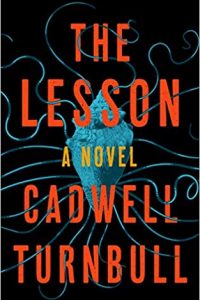Paul Di Filippo Reviews Pennies from Heaven by James P. Blaylock
 Pennies from Heaven, James P. Blaylock (PS Publishing 978-1786368843, trade paperback, 304pp, $21.00) December 2022
Pennies from Heaven, James P. Blaylock (PS Publishing 978-1786368843, trade paperback, 304pp, $21.00) December 2022
I find it incredibly hard to believe that so many years have passed. But databases don’t lie. The Internet Science Fiction Database informs me that PS Publishing issued its first title in 1999—and since then has produced nearly one thousand more! That is some kind of dramatic major milestone for any small press, as they approach their twenty-fifth anniversary. Our field should be heaping laurels upon the heads of Pete and Nicky Crowther and their crew. Their hard work has immeasurably brightened and uplifted fantastika in the twenty-first century.
One of the firm’s most recent offerings, showcasing the standard high quality of all PSP books, is James Blaylock’s Pennies from Heaven, which saw the light of day in December of 2022. Missing its arrival, I was never not going to review it, once I caught up to it. A new novel from Blaylock is a major occasion. His previous one, The Gobblin’ Society, I covered in the pages of Asimov’s in 2020, finding it a fun, quasi-steampunk horror excursion. With Pennies, Blaylock is back in contemporary times, in the setting he loves so deeply and limns so well, small-town California. And this book features more authentic pathos, romance, and comedy than the grand guignol Society. I want to call it a “screwball caper,” a blend of screwball comedy and caper film, and I see thru Google that this term has some little usage already, so let’s go with it!
In the California venue called Old Orange—”the downtown historical district of the City of Orange”—live our three protagonists (and a host of other vivid folks). Blaylock jumps his narrative from one POV to another, to excellent effect, especially in the climactic scenes, where each jump leaves each character in a cliffhanger situation. But I’m getting ahead of myself. Back to our introductions.
Jane and Jerry Larkin are a happily married young couple. Jerry has sufficient funds that he can follow his whims without holding down a job. He’s smart but kind of a daydreamer, handy but a little bit of a doofus. And not a little wrapped up in following his own oddball bliss. Jane—more sober, competent, self-actuated and outward looking— is intent on promoting and expanding the Old Orange Co-Op, a kind of neighborhood organization that will foster community-building activities—victory gardens, festivals, and the like. (Of course, as in every good screwball comedy, they possess a lovable, eccentric dog, in this case named Peewee.). The Larkins also newly inhabit a beautiful historical house.
As a newcomer to the place, Jane wants to make good contacts. So she reaches out to Lettie Phibbs, the slightly dotty owner/manager of the Antiquity Center, a regional library and historical museum, for help and support.
But what the Larkins do not at first realize is that Phibbs is an egomaniacal sociopath, a former murderess with a new identity, who quickly comes to believe that the Larkin home is literally sitting atop a buried treasure that Phibbs knows of and covets. When a small earthquake sends Jerry into the crawlspace below the house and he discovers the treasure, the game is afoot. His display of a couple of rare coins is enough to launch Phibbs onto his back like a vulture.
But none of the parties initially take into account the most important factor: the treasure is guarded by a malign ghost.
Soon, Phibb’s machinations—some ludicrous, some wicked—set off a cascade of actions: breaking and entering, theft, stalking, impersonations, visits to a numismatist under a false identity, the donning of bad wigs and the employment of pistols. As the ghost bequeaths disturbing visions (can Jane’s book club members help exorcise him?) and Phibbs grows more and more desperate, fortunes and lives hang in the balance.
Blaylock doesn’t indulge in slapstick here, but rather a lowkey comedy enacted by not-wildly-unaverage people pushed by circumstances into bad choices, some of which are silly, some of which are menacing. The biggest bad choice made is for Jerry to keep the finding of the ghost and treasure a secret from Jane. This insightful marital glitch—Jerry is just used to handling stuff on his own, plans eventually to reveal it, doesn’t want to bother his wife, etc—lends verisimilitude to the relationship. Likewise, Phibbs is portrayed not as pure Cruella de Vil, but as a woman with some honest, even pitiful passions and affections—her partner in crime, the repugnant Carmody, holds a place in her heart, until he betrays her—whose undoing is sheer greed and self-centeredness.
Blaylock devotes equal attention to Old Orange itself. You’ll feel as if you could map its charming streets and places when the book ends. And his plot construction is impeccable. Just one instance: the word “rain” occurs on the first page of the book, and weather conditions are mentioned throughout—all to build to a stormy peak of action.
The supernatural elements in the book are vital and well done (the eventual capture of the ghost is colorful and ingenious), but the spook stuff takes a backseat to the human dynamics, the caper aspect and the interpersonal hijinks. Blaylock has always had an affection for eccentrics, misfits and visionaries, and while Jane and Jerry are more “normal” and wholesome than his typical cast, they qualify as non-whitebread souls. As for Phibbs, Blaylock succeeds in creating a true monster.
Pennies is very cinematic, and I couldn’t help casting the major parts. Phibbs would be no other than Elsa Lanchester in her prime. Jane could be played by Carole Lombard. Carmody by Elisha Cook, Jr. Finding a Golden Age actor for Jerry is the tough part. He has to be somewhat hunky, but somewhat goofy too. Randolph Scott comes close, but I think we might have to jump eras and pick young George Clooney.
In any case, until Hollywood smartens up and drops bushels of money on Blaylock, you can run this great screwball caper as often as you want, in your own head!
 While you are here, please take a moment to support Locus with a one-time or recurring donation. We rely on reader donations to keep the magazine and site going, and would like to keep the site paywall free, but WE NEED YOUR FINANCIAL SUPPORT to continue quality coverage of the science fiction and fantasy field.
While you are here, please take a moment to support Locus with a one-time or recurring donation. We rely on reader donations to keep the magazine and site going, and would like to keep the site paywall free, but WE NEED YOUR FINANCIAL SUPPORT to continue quality coverage of the science fiction and fantasy field.
©Locus Magazine. Copyrighted material may not be republished without permission of LSFF.







